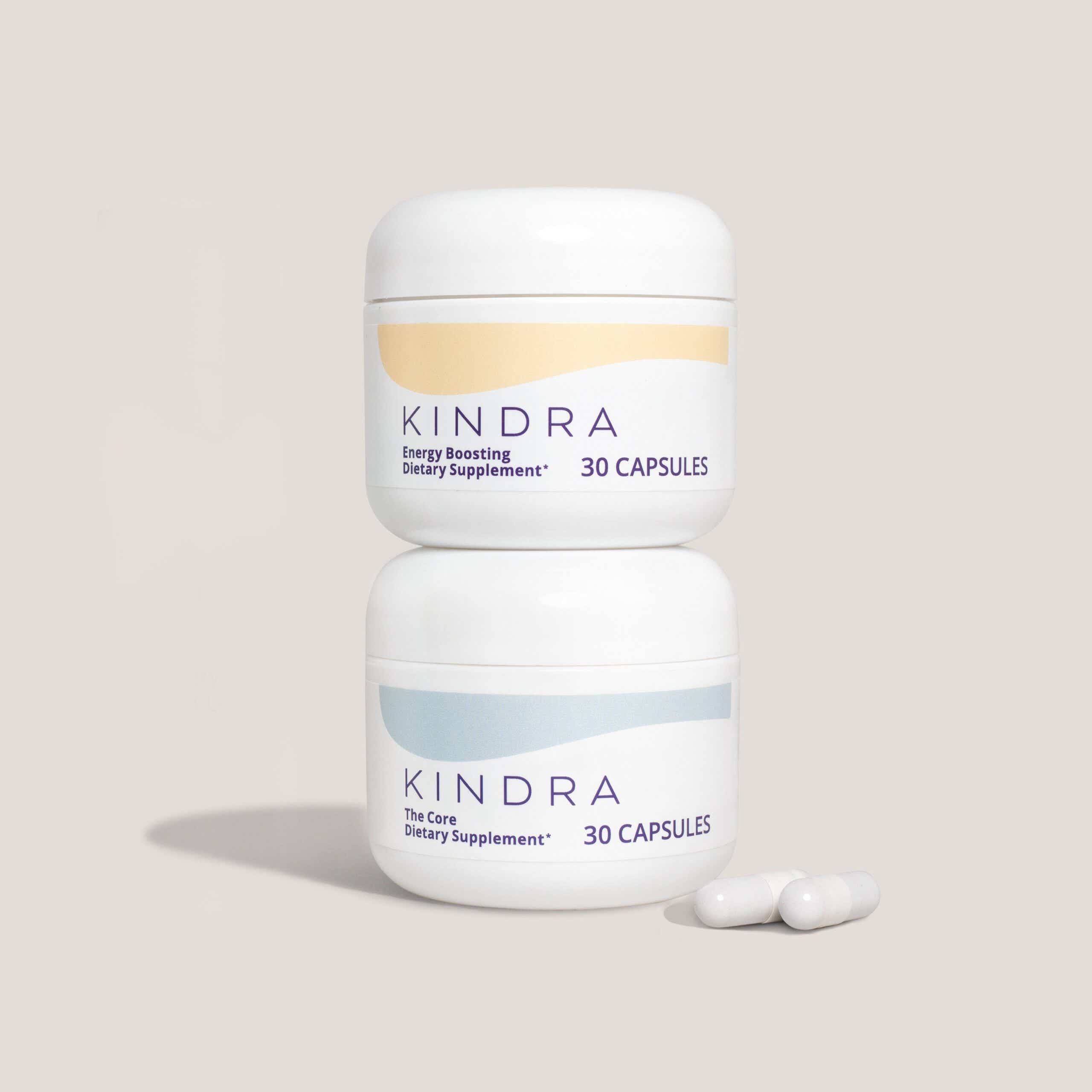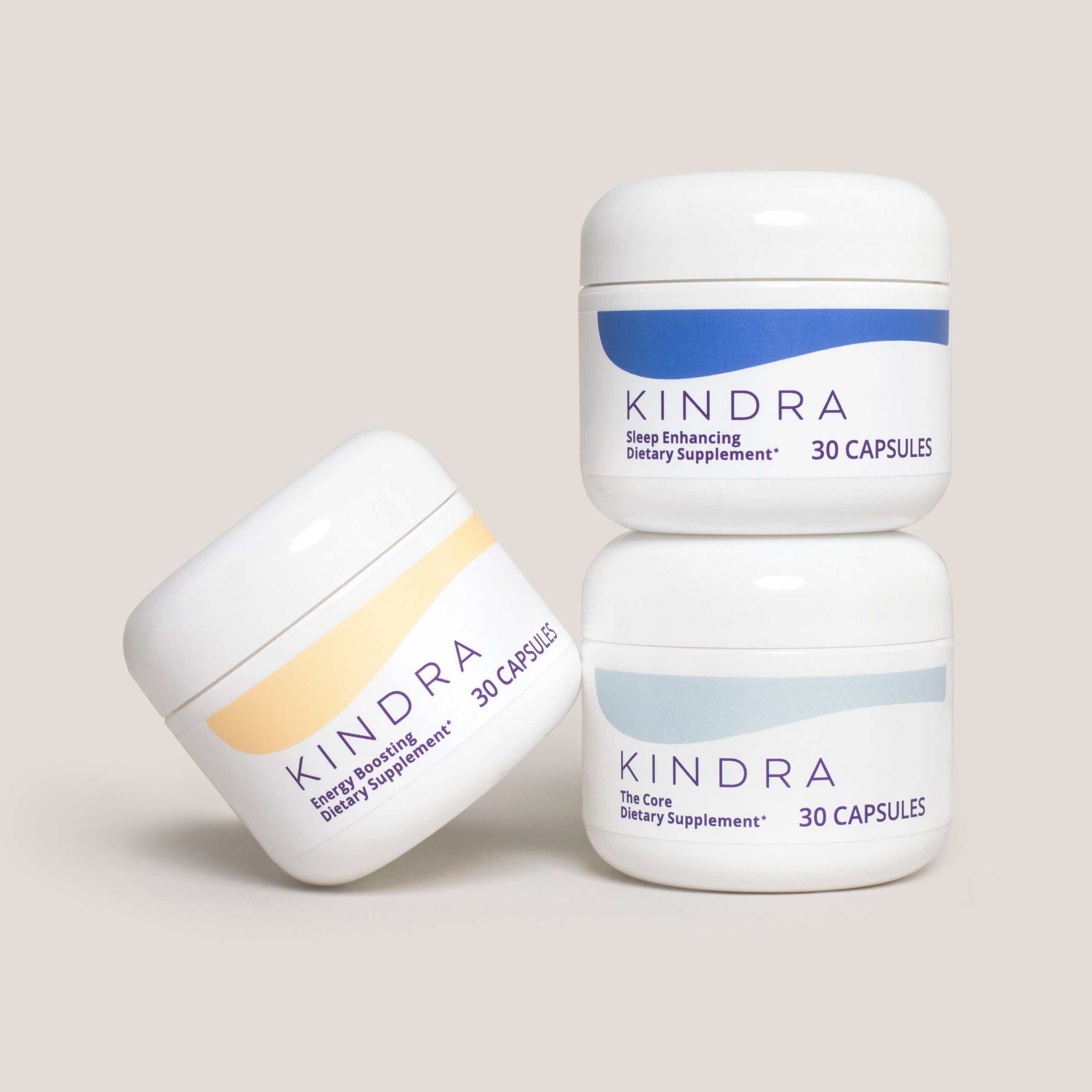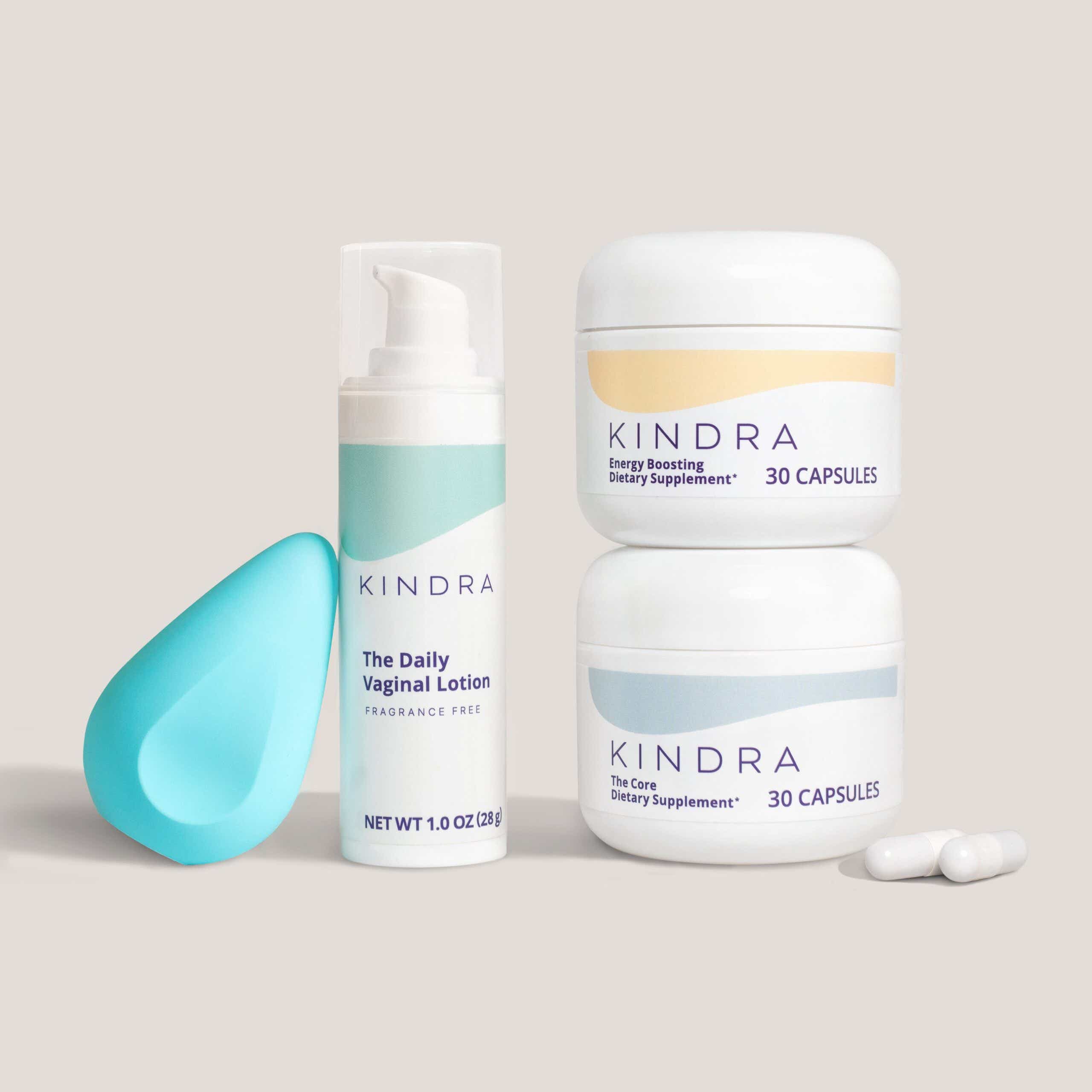More and more companies are ending their flexible work-from-home policies and requiring employees to return to the office — even if it’s just a few days a week.
If you’re one of those employees dusting off your work tote, pulling your blazer out from the far corner of your closet, and dealing with the start of a menopausal transition, we’ve got some expert advice for you on how to manage all the natural changes that come with it (like brain fog, hot flashes, restless nights — even hair loss) while you’re at the office.
After all, it’s not always comfortable to deal with hot flashes in public, and now we won’t have a computer screen-length distance to separate us from our colleagues, or ways to take a private break to cool down.
We asked for your concerns about menopause in the workplace on Instagram, and you certainly answered! So we went straight to Dr. Suzanne Gilberg-Lenz, who specializes in women’s health and sexual wellness (she’s also Kindra’s health expert), to give us all the pertinent info.
First things first: Remember that menopause is natural, and something you can be proud of your body for working through. “Trying to conceal that you’re 51 and going through menopause at work is a lot to ask of somebody, and I don’t think it’s fair,” says Dr. Suzanne. “Don’t feel ashamed: This is a physiologic condition and it’s a great thing — it means you’re still alive.”
Stressed about heading back to the office? Here’s Dr. Suzanne’s expert-approved tips and tricks on navigating that transition while you experience “the change”:
“I used to be a multitasker and now I find I get flustered very quickly. Is this normal?”
“Cognitive issues like brain fog are very common with people making the menopausal transition,” says Dr. Suzanne. While technically, menopause is going 12 months consecutively without a menstrual cycle over the age of 45, the process between being menopausal and post-menopausal can take anywhere from two to 10 years. “I find that people’s biggest problems are in that transition,” she says.
Some women who experience brain fog are concerned they’re experiencing symptoms of Alzheimer’s or dementia, Dr. Suzanne says. “It concerns people when they’re super high functioning, and now they’re forgetting a name, or they don’t know where their keys are, or why they opened their phone to look something up,” she says. “But it’s not necessarily a sign of Alzheimer’s or dementia — although if there’s a strong family history, it’s something people shouldn’t ignore.”
Brain fog can also be a product of stress from the tumultuous last year and a half. “People’s levels of stress are extraordinarily high,” Dr. Suzanne says. “I have patients going through this process during this period of our history. Is it that you’re homeschooling your kid, working from home in the dining room, making dinner, doing laundry, cleaning the house, and worrying that the world is ending? Or is it perimenopause? It could be both.”
“What types of products can I keep on hand if I’m prone to hot flashes during the day?”
If you have your own office or cubicle, Dr. Suzanne suggests putting a miniature fan on your desk to help cool you off. Keeping a hanky handy to pat sweat dry and wearing moisture-wicking fabric (which helps keep you cool and rapidly dries up sweat) can also help, she says.
Another way to manage hot flashes at work? Dabbing on cooling essential oils, like eucalyptus, peppermint, or sandalwood. “Put it at the top of your forehead, behind your ears, and on the back of your neck,” says Dr. Suzanne.
You can also try taking supplements for more sustained, long-term support of hot flash relief. Kindra’s Core supplement — formulated with a potent natural plant extract duo — can make a major difference. (Nearly 70 percent of women reported marked improvement in hot flashes and brain fog after just four weeks.)
“What do you do when you’re visibly sweating (having a hot flash!) in a meeting when you’re presenting?”
“The more anxious you get about, ‘Am I going to hot flash during this presentation?’ or the more riled up you get during it because you’re embarrassed, the worse it’s going to get,” says Dr. Suzanne.
Try coming up with a personal meditation to help slow the frenzy. “Have a calming script for yourself, like, ‘This is a moment, and it’s going to pass.’ Not getting freaked out about it is definitely going to benefit you,” she explains. “Having been a blusher myself as a younger person, the more attention I paid to it, the worse it was.”
“I’m losing my hair. Help!”
There are several reasons why your hair may be thinning, according to Dr. Suzanne, and any anxiety about it is completely understandable. “It’s common, and it’s really upsetting and disturbing to people,” she says. Over-the-counter Rogaine does work, she says, but nutritional deficiencies (like ferritin and vitamin B) could also speed up your hair loss. “When women come to me with this issue, we’ll make sure it’s not their thyroid or some other underlying issue first,” says Dr. Suzanne. “But I also ask them, ‘Did other older women in your family have thinner hair?’ Because unfortunately, that may be your fate as well.”
Hair loss can also be related to the declining estrogen levels that naturally occur during menopause, but that doesn’t necessarily mean that’s the cause, Dr. Suzanne explains.
“What helps rev up a slowing metabolism?”
It’s common for your metabolism to slow down during menopause, but there are things you can do to combat that. “It really has to be a lifestyle change,” says Dr. Suzanne. “The most important thing is to do weight-bearing activities to increase your lean body mass, like weightlifting or body-weight exercises.”
The American Heart Association recommends a minimum of 150 minutes a week of activity to maintain a healthy heart. “Some kind of movement pretty much every day is important,” says Dr. Suzanne. “Getting your heart rate up and exercising isn’t just important for your heart, it’s very important for your brain. It’s important for your bones, for your sex life. You need to get the blood flowing.”
As a bonus, the results will show up faster if fitness isn’t already a part of your everyday routine. “If you’re not an active person, the good news is that starting to do something active will have a huge benefit. If you’re already an active person, please keep that up!” Dr. Suzanne says.
Just make sure you don’t start aggressively restricting calories, since that can actually slow down weight loss. “Calorie-cutting works when you’re younger, but as you get older, your body is like, ‘We’re starving, we have to slow down even more,’” says Dr. Suzanne. “You can’t trick your body.”
“I’m not sleeping well at night and struggle to get through the workday. Any advice?”
First off, make your bedroom a sanctuary of sleep. That means keeping your room cool and powering off devices like your TV, phone, and Kindle at least 60 minutes before you get in bed (tough, but necessary). If you work from your bedroom, says Dr. Suzanne, try to work in a separate area of the room — not from bed. If you’re prone to waking up in the middle of the night, get into bed earlier to “give yourself a little more leeway.”
Supplements, like melatonin, cannabis-based products like CBD, or Kindra’s sleep-enhancing supplements can also help. “They work really well for lots of people, especially if they haven’t used them before,” says Dr. Suzanne.
Also, ask yourself what’s waking you up: Are you getting up to pee? Are you having caffeine or alcohol in the evening? Is it because of a hot flash? If it’s because you need to make a trip to the bathroom, that might be caused by a decrease in the hormone called vasopressin, which naturally declines as you age. “It allows us to suppress the urge to go to the bathroom and that starts to decline, but there isn’t a replacement hormone for it,” says Dr. Suzanne. It could also be your nightly glass of red wine before bed. “People use alcohol to go to sleep, but unfortunately that doesn’t work — you’ll fall asleep but definitely wake up because of it later. The bottom line is that it disturbs your sleep.”
If you’re waking up in the middle of the night from hot flashes, you can treat symptoms. Whether through hormone-replacement therapy, or well-vetted supplements like Kindra’s Core supplement with Pycnogenol, Dr. Suzanne recommends finding the solution that works for you.
Dr. Suzanne’s favorite Kindra products:
Awake Duo
Kindra
Kindra carefully selected super-antioxidant Pycnogenol® (Core & Energy), potent adaptogen Ashwagandha (Core) and Green Tea Leaf Extract (Energy) to power these daily supplements. Benefits include healthy circulation, mental clarity, skin suppleness, and a happy, cool, focused you.
The Hot Flash Knock Out
Kindra
Kindra’s Energy, Core, and Sleep Enhancing supplements work together to reduce muscle aches, support healthy glucose levels, give your brain some extra TLC, and boost hydration inside and out.
Rise & Shine Regimen
Kindra
This kit includes Kindra’s best-selling Daily Vaginal Lotion which helps improves vaginal dryness. Plus: you’ll also get a set of Core and Energy supplements to help keep your hot flashes at bay.
















